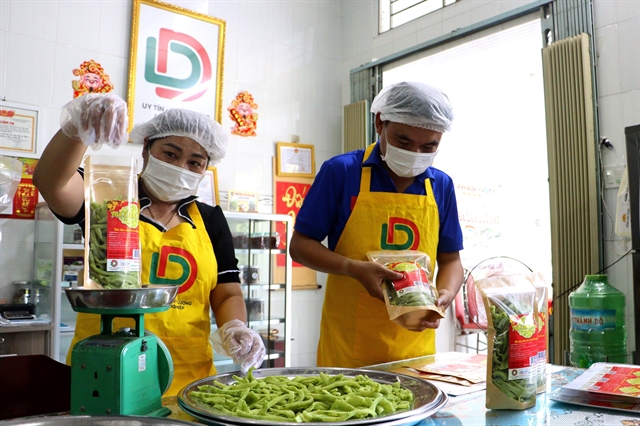 Society
Society

 |
| Workers at Đức Đạt Homemade Coconut Jam Production Household Business in Vĩnh Long Province’s Trung Hiệp Commune pack pandan-flavoured coconut jams. The jam has been recognised as a three-star product under the country’s “One Commune – One Product” programme. – VNA/VNS Photo Lê Thúy Hằng |
VĨNH LONG – The implementation of the country’s “One Commune – One Product” programme in Vĩnh Long Province has helped transform the rural economy, enhancing the value of traditional products and expanding market access through improved quality and branding.
Many traditional products in the Cửu Long (Mekong) Delta province have been upgraded to meet OCOP standards, with improvements in quality, design, packaging, and traceability.
OCOP-recognised products have helped enhance economic value, highlight unique local cultural identities and increase incomes for their producers.
Phạm Văn Nhựt of Lương Hòa Commune said after decades of growing rice without much improvement in his livelihood due to the low price of freshly harvested paddy sold at the farm gate, he decided to change direction.
He began learning how to grow rice sustainably, adopting organic farming methods, composting organic fertiliser and using homemade biological agents to fertilise the grain and control pests.
Instead of selling unprocessed rice, he invested in a rice mill and packaging facility and registered his own brand, “Ba Nhựt”, to market the finished product himself.
His two rice varieties – purple and black sticky – were recognised as three-star OCOP products in July 2023.
These varieties are sold directly to consumers through e-commerce platforms and social media, and have secured distribution contracts with traders both within and outside the province, he said.
OCOP recognition has helped producers in the locality enhance product value and expand markets, and their products are now sold through supermarkets, markets, shops, and e-commerce platforms.
The Sơn Đốc rice cracker craft village in Hưng Nhượng Commune has existed for more than 100 years and has 51 production establishments, many of which have received three-star OCOP certification for their products.
Nguyễn Văn Thiết, who has been involved in this traditional craft for many years, owns four three-star OCOP products: rice paper, glutinous rice crackers, coconut milk rice crackers, and cassava crackers topped with dried banana slices.
All are sold under the “Mười Thiết” brand.
He said: “Since these products were certified under OCOP in December 2022, customers from traditional distribution channels and online platforms have shown great interest due to guaranteed quality and clear origin. As a result, my business has grown rapidly and steadily, providing stable incomes for eight to 16 workers.”
The OCOP programme not only affirms the quality and value of traditional products but also offers stable incomes for locals, he said.
It brings joy and motivation, encouraging production establishments in the craft village to continue improving packaging and design, and enhance production efficiency, helping the village’s reputation spread further, increasing its competitiveness in the market and contributing to its development, he said.
The Ministry of Culture, Sports and Tourism recognised the Sơn Đốc rice cracker craft village as a National Intangible Cultural Heritage in 2018.
The OCOP programme is not only a “new coat” for rural products but also a symbol of the aspiration to progress through local strengths, intelligence and identity, according to Võ Tiến Sĩ, deputy director of the provincial Department of Agriculture and Environment.
With firm direction and flexible implementation, the province is gradually building OCOP brands linked to local characteristics, asserting their position in the market and contributing to comprehensive, sustainable rural development, he said.
According to the department, before the merger of the former Vĩnh Long, Trà Vinh and Bến Tre provinces to create the new Vĩnh Long on July 1, the three had implemented various measures to enhance OCOP product value, such as brand-building support, participation in fairs and exhibitions, supply-demand connection, and e-commerce promotion.
Many OCOP products have been listed on e-commerce platforms like Postmart, Voso and Lazada, which helps expand sales channels, increase revenues for producers and create jobs for rural workers, the department said.
Trade promotion activities such as the OCOP and typical rural industry product week and trade connection conferences with provinces, cities and enterprises have also been prioritised, enabling OCOP products to access wider and more professional markets.
Vĩnh Long has more than 1,000 OCOP products being made in its 124 communes and wards. – VNS




